#Euripides Heracles
Explore tagged Tumblr posts
Text
This is Theseus and then Heracles


22K notes
·
View notes
Text
Heracles and Theseus raising Hippolytus together AU. Maybe everything gets to be okay this time.
0 notes
Text
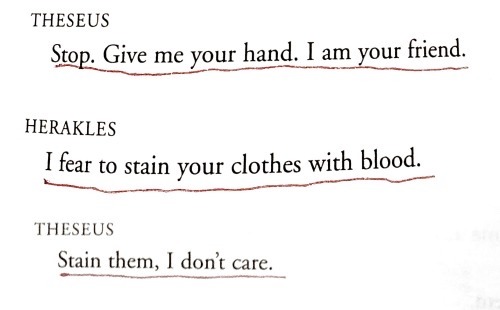
i don't care.
21K notes
·
View notes
Text
Another problem with retellings (as if there aren’t countless lol) is that most have the same “this male character was portrayed as a hero in ancient/modern times but he’s actually terrible” is that like… it ignores that the term “hero” has changed a lot from antiquity to the modern day, in ancient times it just meant an important person who did cool deeds, not necessarily a good/noble person like in the modern day. The ancients KNEW their heroes were horrible ppl, hell the Romans hated Odysseus for the Sack of Troy. These figures doing evil deeds is by design, they didn’t care about making “likable” characters, they cared about showing human complexity and flaws, they cared about creating cautionary tales or explaining history and nature, it’s why so many heroes get divine punishment.
The only reason these heroes are portrayed as “heroic” (as in the modern sense) nowadays is bc Hollywood and other adaptions just can’t help but take these stories and water down or remove all the gross stuff to make these heroes more likable to a modern audience.
#just read/watch Euripides bro#the ancients knew their heroes did horrible shit and wrote about it#Perseus is closest myth character to the modern hero arctype#but even he turned a whole island to stone#which then comedically explained why Seriphos was so rocky#greek mythology#ancient greek mythology#greek pantheon#Greek heroes#perseus#Theseus#Heracles#bellerophon#Jason and the Argonauts
77 notes
·
View notes
Note
Favorite character from Greek mythology + favorite myth from Greek mythology?
It may not seem like it at all but my favorite character from Greek mythology is Heracles, in all of its iterations, (I think the Disney movie played a big role when I was a kid) but you don't see me drawing him as often as others since I still can't figure out his design. As for the myth... Well that's a hard question, I don't think I have one, but I do like the tragedies of Sophocles about Oedipus and of course Heracles by Euripides (still biased)





Plus I will tell you that for a while I was also obsessed with Heracle from record of Ragnarok, the pure definition of an himbo, what can I say, I see a big strong man with zero thoughts and I'm in😭
(the drawing are from 2022 don't mind them too much)


#Euripide really liked angst and so do I#greek mythology#tagamemnon#heracles#herakles#hercules#record of ragnarok#sketch#concept art#greek tragedies#white board fox
92 notes
·
View notes
Text
greek tragedy is like. if you put on clothes you are doomed. if you take off clothes you are doomed. good luck.
#thinking specifically of euripides' heracles and suppliants and bacchae for the former#and aeschylus' agamemnon and libation bearers are my go-tos for the latter#clytemnestra bares her breast hoping it's going to save her but it is in fact what seals her fate#would have to check polyxena's death narration in euripides' hecuba but i believe it's one or the other of these as well#also yael farber's haunted oresteia boots. love those. nobody even wears them and they are so haunted.#mine#bodycostume
268 notes
·
View notes
Text
greek tragedy (mostly familicide bc that's my thesis) as textposts again bc i can't stop myself




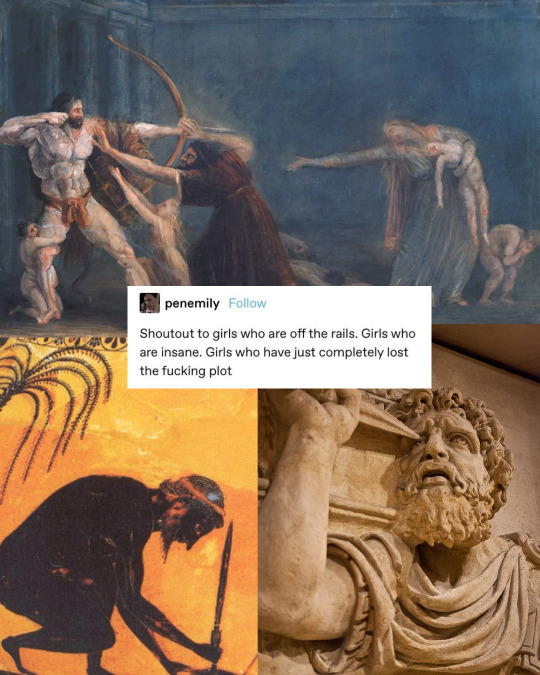

(pt1)
Kreusa and Ion - Ion // Orestes - Oresteia
Alkestis - Alkestis // Iphigeneia - Iphigeneia in Aulis
Herakles/Ajax/Oedipus - Herakles/Ajax/Oedipus Tyrannus // Klytaimnestra - Agamemnon
#tagamemnon#ion#oresteia#alcestis#iphigenia#heracles#ajax#oedipus#clytemnestra#agamemnon#sophocles#euripides#aeschylus
66 notes
·
View notes
Text
i just took my final ancient greek exam of the semester yesterday and have been avoiding studying for my microbiology exam all day. so let's talk about these three devastating lines from anne carson's translation of herakles

and by talk about i mostly mean here's a bunch of different translations

Ἡρακλῆς μαινόμενος - Herakles by Euripides, lines 1398-1400
c. 416 BC.
original text in Ancient Greek via the Perseus Digital Library
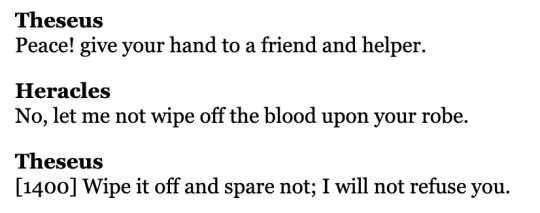
Euripides. The Complete Greek Drama, edited by Whitney J. Oates and Eugene O'Neill, Jr. in two volumes. 1. Heracles, translated by E. P. Coleridge. New York. Random House. 1938.


Herakles translated by Anne Carson in Grief Lessons: Four Plays by Euripides (pg 81-82) 2006
Internet Archive

H of H playbook by Anne Carson (not a direct translation but a reimagining of Herakles, 2021)

Euripides: Herakles, translated by Tom Sleigh, Oxford University Press, 2001
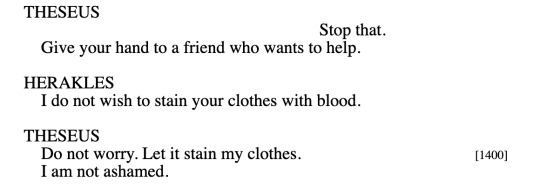
Ian C. Johnston, 2020
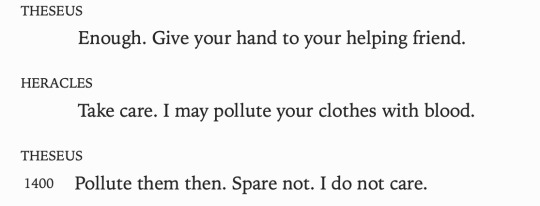
Heracles, translated by William Arrowsmith, from Euripides III: Heracles, the Trojan Women, Iphigenia Among the Taurians, Ion (The Complete Greek Tragedies - Euripides III, University of Chicago Press, 2013 (Arrowsmith's translation itself is from 1956)
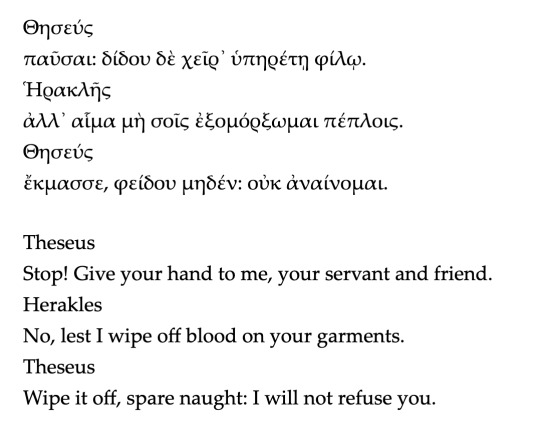
my own translation with notes under the cut
* everywhere that I have used [] I have inserted a word that does not technically appear in the original text.
Theseus Stop! Give [your] hand [to me], [your] servant [and] friend.
*more literally: Stop! Give [your] hand to a servant/helper [and] friend.
* Ancient Greek uses different punctuation, though the : symbol is used roughly the same way as it is in English and exclamation points are not used, verb conjugation in English does not differentiate the imperative mood, which παῦσαι (sg.2.aor.imperat.med-pass) is in, and often the way we show imperative mood in written English is with an exclamation point.
-The word δίδου (sg.2.praes.imperat.act.) is also imperative.
-παῦσαι is said in reference to Herakles’ earlier lines, lamenting his - well, the plot of Herakles.
* The particle δὲ has been omitted from the translation. It’s usually translated as but, and, or then.
* The possessive pronoun your - σός - does not appear but is implied.
* χεῖρ᾽ is the short version of χειρός - hand
* ὑπηρέτῃ φίλῳ are both nouns in dative, here answering the question to whom? The word and - καί - does not appear between the two, likely because poetic language. The word ὑπηρέτῃ can also mean rower, an underling, servant, attendant, assistant, and is often translated here as helper. The word φίλῳ is a form of φίλος - friend, loved, beloved, dear
Herakles No, lest I wipe off blood on your garments.
* Word order changed slightly. The first word is ἀλλ᾽ - poetically shortened version of ἀλλά - usually translated as but, however, here: lest.
* ἐξομόρξωμαι (sg.1.aor.med-pass.) means wipe off or wipe away, but stain is, in my opinion, not an inaccurate translation in regards to the meaning conveyed.
* πέπλοις means any woven cloth, here usually translated as garments, robes or clothes.
* αἷμα means blood and is grammatically either nominative or accusative, probably accusative, μὴ means not and σοῖς is a second person possessive pronoun in plural dative.
Theseus Wipe it off, spare naught: I [do] not refuse [you].
* ἔκμασσε (sg.2.praes.imperat.act.) - wipe it off - is imperative again, so is φείδου (sg.2.praes.imperat.med-pass.) - spare.
* μηδέν I translated as naught as in nothing, οὐκ means not
* ἀναίνομαι is in sg.1.praes.ind. - so present tense would be the most literal translation, ie. I do not refuse you, but the meaning might best be conveyed in English with the use of future tense, ie. I will not refuse you. The word can also mean reject, deny, renounce and disown, or be ashamed. Possible other translations: I don’t deny you; I won’t reject you; I am not ashamed; I won’t renounce you.)
That's all on Herakles, the rest is me rambling about Ancient Greek grammar for interested parties (mostly myself). If I could put a second cut here, I would.
Some further notes on the grammatical cases and verb conjugation. You'll have noticed that I've followed verbs with parentheses with some abbreviations. I'll break those down a little for those not in the know: unlike English, Ancient Greek has different endings to denote the person in verb conjugation - 1.sg being first person singular as in I, and so on with 2.sg - you, 3.sg he/she/singular they, 1.pl - we, 2.pl - plural you, 3.pl - plural they. There's also technically an extant dual form in some texts (when speaking of a pair of two) but it's rare. Ancient Greek conjugation also varies a lot by the temporal tense, the ancient greek times are present (praesens - praes.), future (futurum and futurum III), imperfect (imperfectum), strong and weak aorist (aor. - this one doesn't exist in any modern languages and is a bit of a jeremy bearimy but is usually translated as either present or past, depending on the context), perfect (perfectum), and pluperfect (pluscuamperfectum) - all of these except imperfect and pluperfect (which only have indicative forms) then have various forms - indicative (ind.), infinitive (inf.), imperative (imperat.), optative (opt.) and conjunctive (coni.). Verbs also have an active (act.) and middle and passive or active and mediopassive (med-pass.) form, except some verbs only have mediopassive versions and are thus translated as either active or mediopassive depending on the context. This is as complicated (and fun!) as it sounds. (editors note: the fun! was not sarcastic - i am a medstudent who hasn't had to take two semesters worth of classes on this, nor do i have to keep taking ancient greek next semester but i'm going to)
Nouns in Ancient Greek also have grammatical cases, nominative, genitive, dative, accusative and vocative, as do adjectives. They also have genders, and adjectives of course have positive, comparative and superlative (good, better, best) forms.
Ancient Greek also uses a lot of participles, which is like a noun-ified verb. Participles are also a concept in English, just - a lot simpler in English, and also I think in English a participle is a verb that has some characteristics of an adjective or noun, whereas in Ancient Greek participles and verbal adjectives are separate concepts. Participles are derived from verbs and have the same grammatical cases as nouns, nominative, genitive, dative, accusative and vocative, and singular and plural versions, and have three genders, masc., fem. and neut. - they also have active and mediopassive forms, and differ based on the temporal conjugation of the verb, retaining its augment, reduplication, characteristic added letters (for example σ in the future tense, and θη + σ in the passive future) or lack thereof, also they can have different endings or roots based on the tense. So, yeah, "conjugate and translate this verb in part.fut.pass.sg.masc.gen. and II aor.part.act.sg.acc.fem." is what a test question might look like at my level of studying ancient greek.
Sentence constructions also differ from English, some of the most common ones are AcI, NcI, genitivus absolutus. accusativus duplex and nominativus duplex. They also will often skip words (particularly the verb to be they often deemed unnecessary) and poetic language is its own can of worms with its own theoretical dialects and prosody.
All of this is like, barely scratching the surface, there's also a bunch of different dialects, stuff varies by era, all of the noun cases have like, a Bunch of different uses, and it's all terribly interesting.
#anne carson#should i do#not to me not if it's you#next?#ancient greek#ancient greece#philology#heracles#herakles#euripides#h of h playbook#grief lessons: four plays by euripides#web weaving
52 notes
·
View notes
Text
You know out of all the lost plays from Ancient Greece that we only have a few fragments of to get us an idea of what it might have been about. One lost play that has fascinated me at the moment is the play Pirithous, which was written either by Euripides or Critias (depends on who you ask)
We have a few surviving lines as well as the hypothesis, which itself is what makes it so intriguing as it reads like this:
‘Peirithous went with Theseus to Hades to get Persephone as his wife. He was duly punished for this impiety by being bound to a rock by snakes. Theseus, thinking it shameful to abandon his friend, willingly chose to stay in Hades with him, but on his mission to abduct Cerberus, Heracles released both men, by the grace of the gods of the underworld.'
(Source: Theseus, Tragedy, and the Athenian Empire by Sophie Mills)
So essentially the idea that the play presents is that initially, only Pirithous was bounded to the underworld and Theseus actually had the chance to escape, and yet he didn’t. Instead, he willingly chooses to stay behind and be tortured along with his friend. An idea that I don’t think is found anywhere else
The story definitely has very not so subtle message about the importance of friendship, especially when Heracles arrives on the scene and compliments his loyalty to his friend as being “worthy of Athens and of the Athenian hero.”
On the flip side Pirithous gets most of the blame for the attempted abduction, especially since Theseus gets exonerated, with Heracles asking him what excuse he has for the ruin he brought on himself. Based off the surviving fragments we have, Pirithous brings up how his own father Zeus abducted his mother Dia who was married to Ixion. Which is an interesting parallel and possible interesting justification on Pirithous part
The last noteworthy thing to me is how the hypothesis’s says that by the grace of the underworld gods (Hades and Persephone I presume) both Theseus AND Pirithous were released by Heracles. This idea is mentioned by Diodorus in his 1st AD chronicle though only in passing. It’s interesting to see how old it is actually.
Here’s a link to Alessandro Boschi’s analysis of the play if you would like to read more about it:
https://dionysusexmachina.it/wp-content/uploads/2022/01/Boschi.pdf
#greek mythology#tagamemnon#mythology#theseus#Pirithous#Heracles#a few little ideas/interpretations that I thought of#such as how this probably also explains why Theseus was let go#because he technically wasn’t supposed to be there#it must have been weird to hades to have someone who willingly wants to be tortured for eternity#Minos would encourage it though not out of admiration for Theseus#another interpretation to me is that how this is supposed to take place towards the end of Theseus life#especially within the context of him kidnapping Helen and now trying to kidnap Persephone#so this is Theseus at his absolute worst and perhaps he had a realization that he was kind of asking for this#herakles#Euripides
7 notes
·
View notes
Text
i’m pretty well researched on heracles but i’m not gonna say i know everything so can someone smarter than me provide actual sources that say this because i’m genuinely looking to learn but i haven’t heard this anywhere myself?? when i asked the person that said this for sources, they kept telling me to take a college mythology class which i can’t just do on a random saturday cause random tiktok user told me to but if anyone knows of anything that actually says this, please let me know so i can research more! 🫶
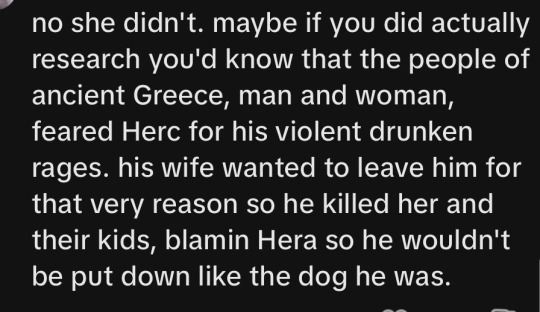
#heracles#herakles#megara#greek mythology#greek gods#ancient greece#euripides#i need answers#please i’m begging
8 notes
·
View notes
Text
ὡς τοῖς γε σεμνοῖς καὶ συνωφρυωμένοις ἅπασίν ἐστιν, ὥς γ᾽ ἐμοὶ χρῆσθαι κριτῇ, οὐ βίος ἀληθῶς ὁ βίος ἀλλὰ συμφορά.
"When it comes to those who are arrogant or miserable, it's my belief that such a life is not really a life; it's nothing but catastrophe."
— Euripides, Alcestis
#classics#classical literature#classical languages#ancient greek#ancient greece#greek tragedy#euripides#alcestis#euripidesposting#quote from heracles btw#translations#ancient greek translations
26 notes
·
View notes
Text
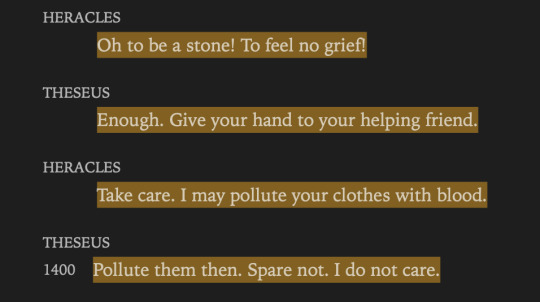
Heracles - Euripides
#₊˚⊹🏷️ by em#idk how I feel abt Heracles being my first quote I’m sharing on here but alas it was the one I read most recently so…#ik this is a kinda popular one but it still hits me regardless so here#euripides#heracles#theseus#greek tragedy#greek plays#hercules#greek mythology#quotes#poetry
26 notes
·
View notes
Text
I think it really says something that in Aristophanes The Frogs when Dionysus said he was reading Euripides’s Andromeda he was filled with “yearning” and Heracles IMMEDIATELY assumed he was horny and/or looking for love. Between this and that one story where Thracians were in a trance like state after watching a performance, what did Euripides put in that play to make ppl react so emotionally?
#greek mythology#ancient greek mythology#greek pantheon#perseus#andromeda#Heracles#Aristophanes#the frogs#Euripides#Perseus and andromeda#Dionysus#dionysos
35 notes
·
View notes
Text

2 notes
·
View notes
Text

H of H Playbook by Anne Carson
3 notes
·
View notes
Text
Why does this hit so hard?
‘To a man who has known happiness amping his fellows, change is a most bitter thing. A man settled in ill luck feels no pain; to him enduring is second nature.’ -Heracles, Euripides.
#greek plays#euripides#heracles#megara#ancient greek mythology#ancient greece#ancient greek art#ancient greek literature
7 notes
·
View notes